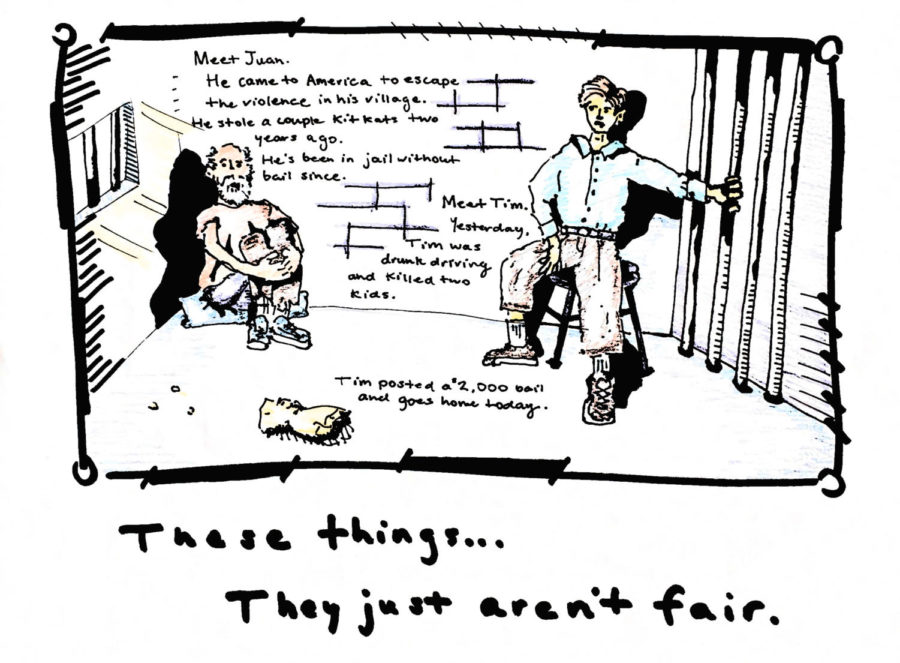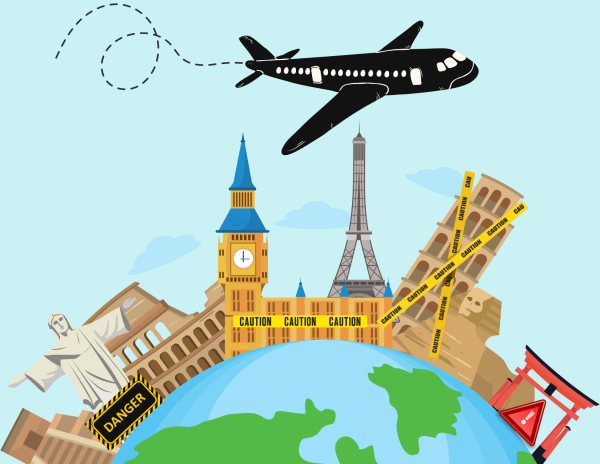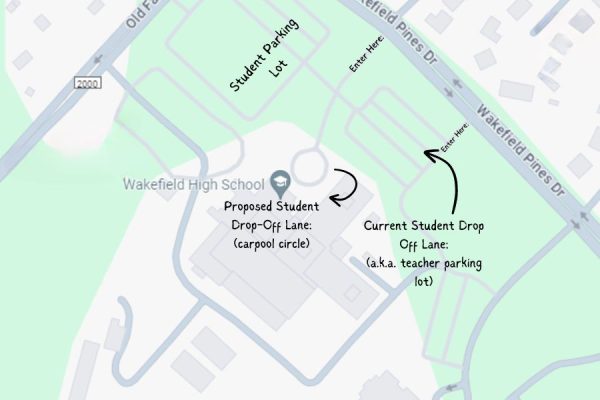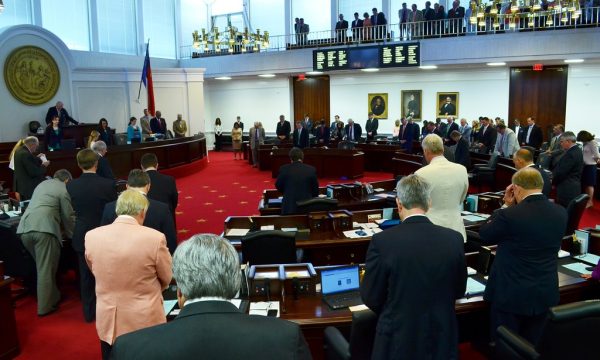Trump’s own way of “pure-blooding” the country
Trump’s enforcement of immigration laws have led to a significant boost of deportation compared to Obama’s era, which leaves many to wonder what is the truly meaning of being an American.
Donald Trump made a great number of promises regarding immigration laws during his presidential campaign. According to PolitiFacts, Trump promised to remove not only criminal, undocumented immigrants of the country but also all of those who are already living in the United States. He declared that he would end birthright citizenship, cancel all funding of sanctuary cities throughout the states and limit legal immigration. Trump now aspires to truly enforce the immigration proposals which were a main part of his campaign and to limit the privilege of being an American, only to those who, by his point of view, “deserve” it.
In order to put these plans into action, Trump issued an executive order on January 25, 2017, merely five days after taking office, which addressed immigration enforcement issues in the state and local law spectrum, according to National Conference of State Legislature (NCSL). The order would, among other things, withhold funds from sanctuary jurisdictions. Sanctuary jurisdictions are laws that limit cooperation with federal immigration authorities, including giving information about the status of immigrants to the federal government and limiting the length of immigration detainers.
Trump’s administration stands strongly against sanctuary policies, which is why it has threatened to cut federal grant money from states that have sanctuary laws to protect undocumented immigrants. California, a state known for its liberal and pro-immigration policies, enacted sanctuary laws in 2017, restricting when and how state law enforcement can cooperate with federal immigration officers.
In response to such an action, the Justice Department recently sued California. According to The New York Times, the federal government filed the lawsuit due to their belief that the new California laws made it impossible for federal immigration officials to do their jobs and deport foreign criminals. Trump argues that sanctuary policies violate federal laws and help criminals evade deportation.
Another controversial decision regarding immigration policy was to appeal to the Supreme Court to allow Trump’s administration to retain the power over Obama’s Deferred Action of Childhood Arrivals(DACA) program and then shut it down. The DACA program shields 700,000 young undocumented immigrants brought to America illegally when they were children from deportation, allowing them to work and go to school. According to The New York Times, Trump called the establishment of the DACA program by Obama an “unconstitutional use of executive power.”
The Supreme Court denied the appeal which seemed to surge hope for the ‘Dreamers’. However, on the next day, the Supreme Court ruled that people held in immigration detention are not entitled to periodic hearings to decide whether or not they may be released on bail, according to The New York Times. Such a decision was a harsh strike, not only for the young ‘Dreamers’, but for all people who had come to America in search of a better future. With such a ruling, immigrants aren’t given rights that some lawyers and activists believe to be a constitutional right for all, no matter if they are in the country legally or not.
The Supreme Court made their decision based on their interpretation of immigration laws, not the Constitution. And it is the Constitution that is being used as an argument for contesting the new ruling’s validity. The question that stroke up a lot of controversy is– Is it constitutional to hold people in jail for an indefinite amount of time without the possibility of bail or hearings, regardless if the crime committed was minor or major? Many who disagree with the new ruling advocate that the national Constitution states that no person “shall be deprived of life, liberty or property without due process of law”. According to the Los Angeles Times, the word ‘person’ has been understood to include non-citizens and immigrants who are here illegally.
Before the newest Supreme Court decision, the policy in effect had been that bond hearings were to be held every six months to determine whether or not detainees who are not a risk to public safety could wait freely among society while their cases proceeded. Now that has changed, meaning that accused immigrants facing deportation can be held by the American government with no bond hearings or no possibility of bail even after months or years of detention.
The Supreme Court’s latest ruling aids Trump’s order of a ‘crackdown on immigration violations’ enforced at the beginning of his presidency, which gave ICE officers authority and autonomous power to detain immigrants who have no criminal record but are thought to be in the country illegally. That brings a large amount of fear to, according to Pew Research, about 11 million unauthorized immigrants in the United States who consisted of 5% of the labor force as of 2015. According to USA Today, arrests of undocumented immigrants without a criminal record jumped 156% from last year. This means that although Trump’s order of giving more autonomy and power to the ICE officials was designed so that the officials could arrest a higher number of immigrants with a criminal record, in practice it turned into detaining illegal citizens in general.
“The president made it clear in his executive orders: There’s no population off the table,” ICE’s director Thomas Homan said according to Dissent Magazine, “If you’re in this country illegally, we’re looking for you and we’re going to look to apprehend you.” According to USA Today, between January 22 and April 29, ICE arrested 10,845 people whose immigration violations were the only marks on their record. That’s nearly triple the 4,242 people arrested during the same time period in President Barack Obama’s final year in office.
One of the most discussed and controversial promises from Trump’s presidential campaign was to build a wall separating Mexico from the United States, with the purpose of halting illegal immigration. According to Telegraph, the existing border fence between the United States and Mexico cost about $2.4 billion and was approved by Senate in 2006. The barrier is a grouping of relatively short physical walls, secured with a system of sensors and cameras monitored by the United States Border Patrol. As of January 2009, U.S. Customs and Border Protection reported that the fence had more than 580 miles of barriers in place. The total length of the continental border is 1,989 miles.
Building the rest of the ‘wall’ would cost between $15 billion and $25 billion, with an annual maintenance cost of $700 million, according to an estimate by Marc Rosenblum, the deputy director of the US Immigration Policy Program. That’s an awful large amount of money just for a wall which its sole purpose being to separate Mexico and the U.S even further and to stop illegal immigrants. It leaves the country, as well as the international community, to wonder if we have come to a moment in time where division is worth more investments than improving education, spurring the economy and creating jobs for not only immigrants but for Americans as well.
All of these actions benefiting a stricter immigration system lack one important concept: It is easier to build walls and throw people extremely in need back to their deficient, violent native countries than to build policies that unite the world. We, as an international community, should work much more on enabling smaller countries’ citizens to also have opportunities of growing and improving their lives, legally, rather than shutting them down completely wherever they turn to.
Your Turn Questions:
- Do you think Trump’s enforcement of immigration policies are beneficial to the country or not?
- Do you think it is possible to have a healthy balance between enforcing immigration laws and aiding immigrants in need?
- Another one of Trump’s policies was restricting granting shelter to people from war-ridden countries, especially from the Middle East. Do you think that’s cruel or reasonable?
- If enforcing border policies and immigration laws are a must internationally, will citizens from poor countries simply be left under terrible life conditions with no aid?














